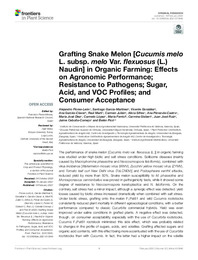Título :
Grafting Snake Melon [Cucumis melo L. subsp. melo Var. flexuosus (L.) Naudin] in Organic Farming: Effects on Agronomic Performance; Resistance to Pathogens; Sugar, Acid, and VOC Profiles; and Consumer Acceptance |
Autor :
García Martínez, Santiago 
Flores-León, Alejandro
González, Vicente
GARCES-CLAVER, ANA 
Martí, Raúl
Julián López, Carmen 
Sifres, Alicia
Pérez de Castro, Ana
Díez, María José
López, Carmelo
Ferriol, María
Gisbert, Carmina
Ruíz, Juan José 
Cebolla-Cornejo, Jaime
Picó, Belén |
Editor :
Frontiers Media |
Departamento:
Departamentos de la UMH::Biología Aplicada |
Fecha de publicación:
2021-02 |
URI :
https://hdl.handle.net/11000/35976 |
Resumen :
The performance of snake melon [Cucumis melo var. flexuosus (L.)] in organic farming
was studied under high biotic and salt stress conditions. Soilborne diseases (mainly
caused by Macrophomina phaseolina and Neocosmospora falciformis), combined with
virus incidence [Watermelon mosaic virus (WMV), Zucchini yellow mosaic virus (ZYMV),
and Tomato leaf curl New Delhi virus (ToLCNDV)] and Podosphaera xanthii attacks,
reduced yield by more than 50%. Snake melon susceptibility to M. phaseolina and
Monosporascus cannonballus was proved in pathogenicity tests, while it showed some
degree of resistance to Neocosmospora keratoplastica and N. falciformis. On the
contrary, salt stress had a minor impact, although a synergic effect was detected: yield
losses caused by biotic stress increased dramatically when combined with salt stress.
Under biotic stress, grafting onto the melon F1Pat81 and wild Cucumis rootstocks
consistently reduced plant mortality in different agroecological conditions, with a better
performance compared to classic Cucurbita commercial hybrids. Yield was even
improved under saline conditions in grafted plants. A negative effect was detected,
though, on consumer acceptability, especially with the use of Cucurbita rootstocks.
Cucumis F1Pat81 rootstock minimized this side effect, which was probably related
to changes in the profile of sugars, acids, and volatiles. Grafting affected sugars and
organic acid contents, with this effect being more accentuated with the use of Cucurbita
rootstocks than with Cucumis. In fact, the latter had a higher impact on the volatile organic compound profile than on sugar and acid profile, which may have resulted in
a lower effect on consumer perception. The use of Cucumis rootstocks seems to be a
strategy to enable organic farming production of snake melon targeted to high-quality
markets in order to promote the cultivation of this neglected crop.
|
Palabras clave/Materias:
flexuosus
grafting
fruit quality
organic agriculture
soilborne pathogens |
Tipo de documento :
info:eu-repo/semantics/article |
Derechos de acceso:
info:eu-repo/semantics/openAccess
Attribution-NonCommercial-NoDerivatives 4.0 Internacional |
DOI :
https://doi.org/10.3389/fpls.2021.613845 |
Publicado en:
Front. Plant Sci. , 19 February 2021 Sec. Crop and Product Physiology Volume 12 - 2021 |
Aparece en las colecciones:
Artículos - Biología Aplicada
|
 La licencia se describe como: Atribución-NonComercial-NoDerivada 4.0 Internacional.
La licencia se describe como: Atribución-NonComercial-NoDerivada 4.0 Internacional.
.png)
